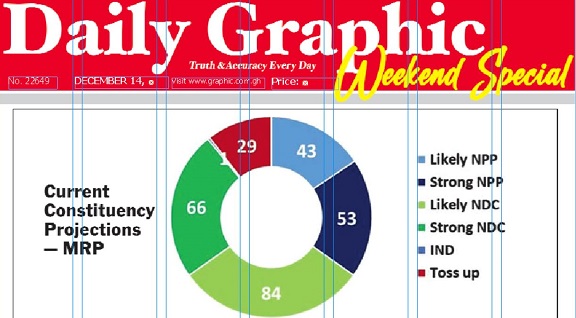
Elections expose charlatans
Promises can fail, pledges may not be honoured, but the 2024 presidential and parliamentary elections have exposed the different categories of polls and prophecies.
The emphatic victory of the opposition National Democratic Congress (NDC) in the elections was an outcome that only Mussa Dankwah of Global InfoAnalytics, an independent opinion research company in the country, and some prophets could tell with precision.
While prophecy has no scientific basis, its realisation supposedly tells a prophet's relationship with God.
In effect, those whose prophecies came to pass are regarded as being genuine servants of God.
Prophecies and pastors
The heat of the elections had put the integrity and reputation of some academics and “Men of God” on the line as they stuck out their necks too long in the prediction game.
When the clergy in Accra responded to the call of Mr Mahama to a prayer session, Rev. Isaac Owusu Bempah of the Glorious Word Power Ministries International prophesied that God had granted Mr Mahama’s wish to make him President for a second time.
That prophecy had been preceded by similar pronouncements by Rev. Ebenezer Adarkwa Yiadom, aka Prophet 1, of the Ebenezer Miracle Worship Centre in Kumasi, and Prophet Nigel Gaisie of the Prophetic Hill Church Worldwide.

But it was Rev. Owusu Bempah who appeared to have irked the New Patriotic Party (NPP) the most with the live broadcast of his prophecy, with less than four months to the polls.
Indeed, his genuineness had been called into question by some members of the public who posted videos of his engagement with other notable politicians that suggested he had given them his blessings too.
Other leaders of the Christian faith subsequently declared counter prophecies against a Mahama victory in December 2024, as they found the space wide open to explore the apparent lottery venture.
For the religious, prophets who foretell events and outcomes are a core part of the physical ecosystem where the words of the prophet are justified by time.
But the elections of December 2024 have left the integrity, image and credibility of some of those personalities in tatters and enhanced the credibility of those whose words appeared to be against the odds.
Polls, pollsters
Even the scientific exercise of polls suffered similar abuse, with Global InfoAnalytics standing out tall.
On November 29, 2024, eight days before the elections, Mr Dankwah predicted a first-round victory for the NDC, predicting further that the party would win a clear majority of at least 150 seats in Parliament.
His polls were referenced by the Economist Intelligence Unit and the Oxford Economics Africa, two respected international research bodies, with both also projecting comfortable victories for John Dramani Mahama and the NDC.
But Mr Dankwah’s survey results were markedly different from similar works by Professor Smart Sarpong of the Kumasi Technical University, Dr Isaac Owusu Mensah of the Office of the President and the Governance Research Bureau.
In his widely referenced work, Prof. Sarpong predicted a second round for the presidential election, putting the governing NPP in the lead with at least 49 per cent of the expected votes.
That poll gave the NDC just above 45 per cent of the votes, and projected a clear majority of seats for the NPP in the next Parliament.
Other polls
Prof. Sarpong had suggested in an earlier survey that the NDC was more popular than its presidential candidate, Mr Mahama, while the NPP’s candidate, Dr Mahamudu Bawumia, appeared more popular than his party.
Dr Owusu Mensah’s survey had also suggested a likely second round outcome, also putting the NPP in the lead in the presidential race.
The Governance Research Bureau, using a formula that tabulates the previous elections results, also projected a second-round presidential race, and also put the NPP ahead of its competitors.
Criticism
All of the polls had attracted wild criticism from those they did not favour, with the NPP in particular taking Mr Dankwah and the Global InfoAnalytics to the cleaners.
His poll had suggested that the governing party was likely to be affected by voter apathy.
The poll had revealed that 16 per cent of voters who said they would not vote had pledged allegiance to the NPP, with three per cent of this group identifying with the NDC.
It said 38 per cent indicated floating status, four per cent belonged to the other parties, 39 per cent had declined to reveal their party affiliations, while 4.4 per cent of respondents said they would not vote in the election.
“Crucial in winning the December elections will be which of the presidential candidates receives greater support in his base, as well as winning the votes of floating (independent) voters,” Global InfoAnalytics said in the release of one of its poll results.
Ultimately, the executive summary of the poll suggested that "the race is unlikely to go into a run-off as the year average of the poll shows Mr Mahama on 53 per cent, Dr Bawumia on 36 per cent, Alan Kwadwo Kyerematen on seven per cent, Nana Kwame Bediako on three per cent, and others on one per cent".
There is nothing better than reality and research, one based on scientific approach, are always bound to correctly predict the right trend, albeit with their own suggested margins of error.
